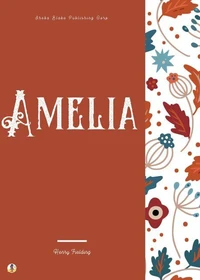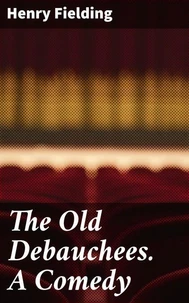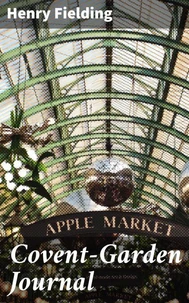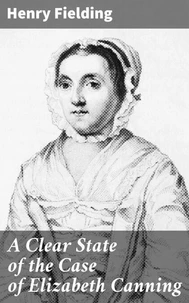Covent - Garden Journal
Par :Formats :
Disponible dans votre compte client Decitre ou Furet du Nord dès validation de votre commande. Le format ePub est :
- Compatible avec une lecture sur My Vivlio (smartphone, tablette, ordinateur)
- Compatible avec une lecture sur liseuses Vivlio
- Pour les liseuses autres que Vivlio, vous devez utiliser le logiciel Adobe Digital Edition. Non compatible avec la lecture sur les liseuses Kindle, Remarkable et Sony
 , qui est-ce ?
, qui est-ce ?Notre partenaire de plateforme de lecture numérique où vous retrouverez l'ensemble de vos ebooks gratuitement
Pour en savoir plus sur nos ebooks, consultez notre aide en ligne ici
- Nombre de pages40
- FormatePub
- ISBN859-65--4716458-6
- EAN8596547164586
- Date de parution10/08/2022
- Protection num.Digital Watermarking
- Taille559 Ko
- Infos supplémentairesepub
- ÉditeurDIGICAT
Résumé
Henry Fielding's "Covent-Garden Journal, " first published in 1752, is a captivating exploration of the social fabric of 18th-century London through the lens of its bustling theatre district. Composed in the form of a periodical, the work showcases Fielding's keen observational skills and irreverent wit, employing a rich prose style that blends satire with earnest commentary. This collection of essays addresses the vices and virtues of contemporary society, while also reflecting larger themes of morality and the human condition, placing it within the broader context of early modern English literature that aimed to critique and entertain simultaneously.
Fielding, a distinguished novelist and playwright, was deeply influenced by his experiences in the legal profession and the theatrical world. Known for his assertive commentary on societal norms and his foundational contributions to the novel form, Fielding's life in London exposed him to the joys and absurdities of the era. His work serves as a microcosm of Enlightenment thought, merging criticism with creativity, ultimately encouraging readers to reflect upon their own moral standings amidst a rapidly changing society.
"Covent-Garden Journal" is an essential read for anyone interested in the interplay of literature and social commentary. Fielding's masterful use of satire and insight into human nature invites readers to engage with the complex dynamics of their own time, making it a timeless piece that resonates well beyond the 18th century.
Fielding, a distinguished novelist and playwright, was deeply influenced by his experiences in the legal profession and the theatrical world. Known for his assertive commentary on societal norms and his foundational contributions to the novel form, Fielding's life in London exposed him to the joys and absurdities of the era. His work serves as a microcosm of Enlightenment thought, merging criticism with creativity, ultimately encouraging readers to reflect upon their own moral standings amidst a rapidly changing society.
"Covent-Garden Journal" is an essential read for anyone interested in the interplay of literature and social commentary. Fielding's masterful use of satire and insight into human nature invites readers to engage with the complex dynamics of their own time, making it a timeless piece that resonates well beyond the 18th century.
Henry Fielding's "Covent-Garden Journal, " first published in 1752, is a captivating exploration of the social fabric of 18th-century London through the lens of its bustling theatre district. Composed in the form of a periodical, the work showcases Fielding's keen observational skills and irreverent wit, employing a rich prose style that blends satire with earnest commentary. This collection of essays addresses the vices and virtues of contemporary society, while also reflecting larger themes of morality and the human condition, placing it within the broader context of early modern English literature that aimed to critique and entertain simultaneously.
Fielding, a distinguished novelist and playwright, was deeply influenced by his experiences in the legal profession and the theatrical world. Known for his assertive commentary on societal norms and his foundational contributions to the novel form, Fielding's life in London exposed him to the joys and absurdities of the era. His work serves as a microcosm of Enlightenment thought, merging criticism with creativity, ultimately encouraging readers to reflect upon their own moral standings amidst a rapidly changing society.
"Covent-Garden Journal" is an essential read for anyone interested in the interplay of literature and social commentary. Fielding's masterful use of satire and insight into human nature invites readers to engage with the complex dynamics of their own time, making it a timeless piece that resonates well beyond the 18th century.
Fielding, a distinguished novelist and playwright, was deeply influenced by his experiences in the legal profession and the theatrical world. Known for his assertive commentary on societal norms and his foundational contributions to the novel form, Fielding's life in London exposed him to the joys and absurdities of the era. His work serves as a microcosm of Enlightenment thought, merging criticism with creativity, ultimately encouraging readers to reflect upon their own moral standings amidst a rapidly changing society.
"Covent-Garden Journal" is an essential read for anyone interested in the interplay of literature and social commentary. Fielding's masterful use of satire and insight into human nature invites readers to engage with the complex dynamics of their own time, making it a timeless piece that resonates well beyond the 18th century.












